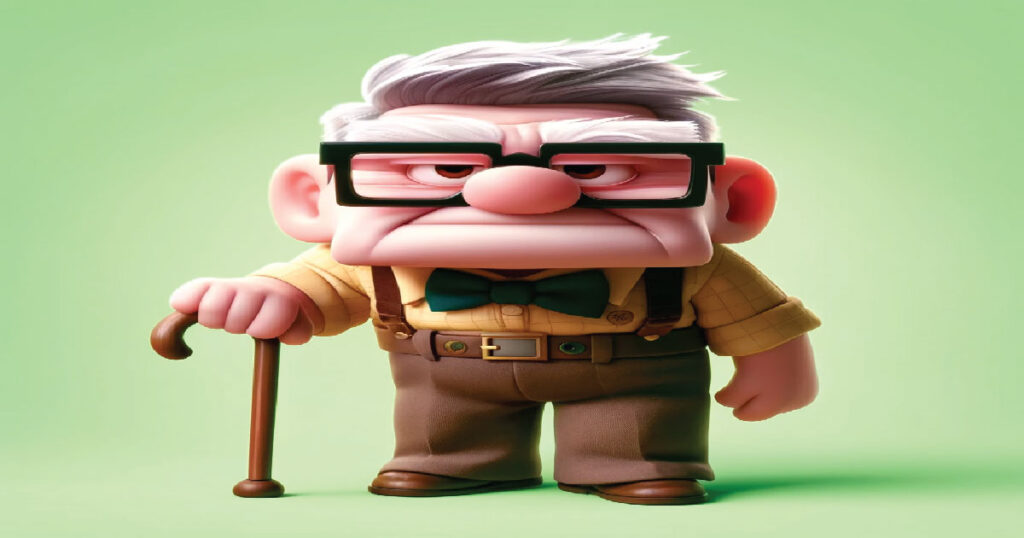Crotchety Geezer with a Heart of Gold: Unpacking the Archetype
Think of someone you know who always seems to be in a bad mood, but if you get past that, they are really a cream puff. Perhaps it is a neighbor, grandparent, or a character from a favorite book or movie. That is the essence of the character known as the “crotchety geezer with a heart of gold,” one of those charmed character archetypes for whom we feel a special, ageless affection.
This interesting yet entirely complex character can be seen in various plots, but no matter where he is, he always captures the audience’s heart. Let’s look a little deeper into the character type, and its essence in stealing the audience’s hearts.
Etymology and Linguistic Roots
The term itself is a delightful combination of adjectives. “Crotchety” means irritable, or cranky. “Geezer” is just an informal word for an older man. Add “heart of gold” to that and you have an oxymoron: somebody tough on the outside but really quite nice.
Remember that crossword puzzle that had so many of you going not long ago? The answer “Grumpyoldmensch” combines “grumpy old man” with “mensch,” a Yiddish term with the rough English equivalent of a person of integrity and honor, a good doer of good deeds, and just all around good guy.
Really a brilliant way to describe someone outwardly grouchy but inwardly noble, isn’t it? “Can you think of someone in your life who is crotchety on the outside but sweet on the inside?
Historical and Cultural Context
Characters like this have been around forever. They reflect our views on aging and wisdom. In old stories, older characters often show a mix of annoyance and deep compassion. Take Eumaeus in Homer’s “Odyssey.” He’s definitely rough around the edges, but his loyalty and kindness to Odysseus are undeniable. Or consider Shakespeare’s King Lear, whose journey is part crotchet, part deep emotional struggle. These characters show us that age comes with a mix of challenges and insights.

Examples in Modern Media Crotchety Geezer with a Heart of Gold
You’ll probably recognize this archetype in your favorite movies or TV shows. Here are some memorable examples:
Carl Fredricksen from “Up” (2009):
- Who could forget Carl? He starts off as a grumpy old man, set in his ways, but as the movie progresses, we see his softer side, driven by a promise to his late wife. His adventure with young Russell surely melts our hearts.
Ebenezer Scrooge from “A Christmas Carol”:
- Scrooge is the classic example of it all. It’s the powerful redemption within that tale—leaking a cover of compassion—that morphs a mean curmudgeonly old man into a man of benevolence. Do you ever find a change of heart, like what comes to Scrooge?
Walter Matthau in “Grumpy Old Men” (1993):
- Max Goldman, played by Walter Matthau, is the archetypal crotchety old man. His exterior is grumpy in a way that belies a region of his being that is tender, especially when it comes to his old friend and rival. Do you know someone hard from the outside but soft toward those they are close to?
Red Forman from “That ’70s Show”:
- Red Forman seems to be an all-business kind of guy, and although he may appear out of reach when he is outside the work environment and at home, he takes on a completely different character. Do you have such a character in the family: strict but caring?

Psychological Insights Crotchety Geezer with a Heart of Gold
We come to love these characters because of the human element they add to people; we all are a mixture of good and bad, and knowing someone’s history may simply put into perspective why he or she is the way they are. These characters teach us about the possibility of change and redemption. For example, in the case of Scrooge, his redemption signified that it was never too late for a person to transform into a different being.
The Role of Humor and Pathos
Humor plays a big role in making these characters endearing. The contrast between their gruff exterior and unexpected kindness often creates funny moments, making their acts of generosity even more touching. Who didn’t laugh and cry during Carl’s adventures in “Up”?
These characters often have backstories filled with loss or hardship, which elicit empathy from us. Understanding the reasons behind their grumpiness helps us connect with them on a deeper level. Have you ever discovered a surprising story behind someone’s tough demeanor?
Crossword Puzzles and Cultural Reflection
Recently, the phrase “crotchety geezer with a heart of gold” appeared as a crossword puzzle clue. This shows how ingrained this archetype is in our culture. Crossword puzzles often reflect popular idioms and cultural references, highlighting how widely recognized and understood these characters are.
Crossword enthusiasts play a part in keeping this cultural knowledge alive. Solving puzzles not only challenges the mind but also keeps these beloved character types in our collective memory. Have you ever felt a sense of accomplishment after solving a tricky crossword?
FAQ
Q: What about a “crotchety geezer with a heart of gold“?
A: This character is quite similar to that of a crotchety old man, one who seems gruff and sullen on the outside but really has a warm and loving spirit at the core. He is often called crusty, but the character is definitely a good hearted.
Q: Why do these types of characters have such an appeal in media?
A: These types of characters have always held a great appeal in media, as they do really represent the dualistic aspect of human beings. It simply proves there are many layers to people and that even the grouchiest person can have a soft center. This is what makes them so relatable and endearing.
Q: Can you list more examples of this type of character, drawn from literature?
A: Besides the examples in age-old movies and TV shows, one of the most interesting ones that can be found in literature is in Charles Dickens’ “A Christmas Carol,” containing the character of Ebenezer Scrooge. Another good example is in Homer’s epic “Odyssey,” containing the character of Eumaeus.
Q: How do such characters affect an audience?
A: They usually give forth humor and compassion from an audience. Their gruffness is funny, while their underlying kindness is touching and heartwarming at the same time, making them unforgettable and dear to the viewer’s heart.
Q: Are there female equivalents of this character type?
A: Yes, the same character type mostly relates to “cranky old ladies” or “grumpy grandmas” and remains tough on the outside but sweet inside.
Conclusion
From the crotchety geezer with a heart of gold, loved all around the world for ancient tales into modern movies, and that combination of grumpiness and hidden kindness, one cannot help but have their heartstrings pulled. They teach us that deep down, everyone else is the same and that just a little bit of empathy and understanding will uncover the good within even the grumpiest exterior.
As we continue to come across such characters in any form, we come to find the challenge in getting through the surface irritability and grasping the inherent goodness that might lie beneath. Be it humor, pathos, or tales of morality, there’s just something special in the crotchety geezer with a heart of gold.

